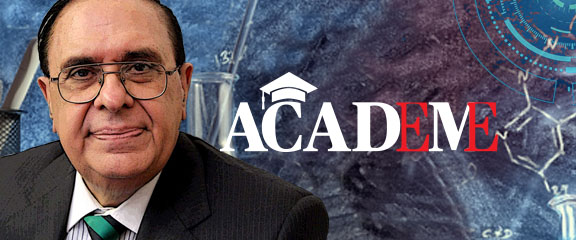There is a silent revolution in education, science, technology and innovation underway under the leadership of Prime Minister Imran Khan, after a decade of neglect. On my suggestion, Prime Minister Imran Khan agreed to establish the “Technology-Driven Knowledge Economy” Task Force of which he is Chairman and I happen to be the Vice Chairman. It has many key Federal Ministers as members including the Federal Ministers of Finance, Planning, Education, Science & Technology and IT/Telecom. It also includes top industrialists, eminent scientists and engineers as members. The focus of the Task Force is on new and emerging technologies that are propelling the 4th industrial revolution, including Information Technology, Artificial Intelligence, Machine Learning, Robotics, next generation genomics, industrial biotechnology, nanomaterials, regenerative medicine, energy storage systems etc.
Over Rs. 100 billion worth of projects have been approved, which is a phenomenal change when one considers that the total development budget of the Ministry of Science & Technology (MoST) was only about Rs. 800 million just a couple of years ago. The 600 percent increase in the budget of MoST and significant increases in the budgets of Higher Education Commission, Ministry of IT/Telecom and other Ministries that are benefiting from the Knowledge Economy Task Force projects symbolise the new Pakistan in which knowledge will be the key driver for socio-economic development.
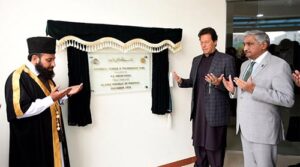
A shining example of the projects undertaken include the Pak-Austrian University of Applied Sciences and Technology in Haripur, Hazara, which was set up under my supervision and started to function last year within a record time of about 2.5 years after project approval. It is the first university in the world in which eight foreign universities are partners (five from China and three from Austria). Another new foreign engineering university is being developed, also under my supervision, in Sialkot, for which Rs. 16.7 billion have been approved. A third foreign engineering university is being set up in the lands behind PM House in Islamabad.
The Task Force has also been involved in the national battle against coronavirus with many successes. They include: 1) Clinical trials on coronavirus patients with Sinopharm vaccine at Pakistan’s premier research centre, the International Centre for Chemical and Biological Sciences at the University of Karachi; 2) Investigating the changing genetic structure of the virus with time in the Jamil-ur-Rahman Centre for Molecular Medicine established in the name of my father Jamil-ur-Rahman through my personal donation 3) Carrying out clinical trials of a number of drugs on COVID-19 patients at some 12 hospitals across the country, 4) Magnifying the national coronavirus testing facilities in Lahore and Karachi ; 5) Promoting the indigenous manufacture of ventilators and other medical devices, and 6) Establishing a major national centre for virus research in Karachi.
Our universities are suffering from an acute shortage of qualified faculty with most universities having only one PhD level faculty member for every 120 students, whereas there should be one PhD level faculty member for every 10 or 15 students. To address this gap, the PM’s Task Force on Knowledge Economy has initiated a major scholarship programme of Rs. 13 billion for sending our brightest students to the leading universities of the world for PhD level training. The Task Force is also setting up many Centres of Excellence in the fields of Artificial Intelligence and other emerging technologies. According to a report from McKinsey Global these technologies are predicted to have an impact of $100 trillion by the year 2025. Another excellent programme of the Task Force was directed at bringing transparency in the tax collection system. An additional sum of Rs. 65 billion was collected by linking FBR data to NADRA, and using Artificial Intelligence techniques.
Excellent online courses are available internationally at school, college and university levels. We can benefit from these Massive Open Online Courses (MOOCs) by integrating them into our educational programmes. Therefore, access to quality education through Open Distance Learning is being encouraged and the Task Force has had a major programme approved to promote distance education across Pakistan with a Rs. 6 billion project for the Virtual University.
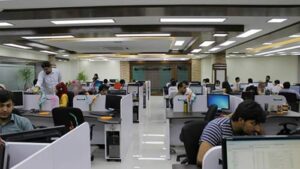
The foundation for developing a strong Knowledge Economy in Pakistan was laid in the year 2000 when I was appointed Federal Minister of Science and Technology and later as the founding Chairman of the newly established Higher Education Commission. What happened subsequently was described as a “miracle” by the famous German Professor Wolfgang Voelter of the University of Tübingen. We sent thousands of students abroad to universities around the world for PhD level studies, established a huge research fund, set up Pakistan’s first digital library, placed Pakistan’s first satellite in space, (Paksat 1), a section of which was set aside for education.
The PhD output increased substantially from 60 per annum to 1500 per annum with emphasis on quality through indigenous, merit-based foreign PhD scholarships, split PhD programmes, and teachers and researchers’ overseas scholarship schemes. Our focus was to first improve quality through faculty development. So we spent a huge amount of funds on identifying the brightest young men and women through a highly competitive selection process, sending them for PhD level training to top universities abroad, and attracting them back to Pakistan with good research funding and excellent salaries under a new performance based “tenure track” system. The world’s largest Fulbright programme was initiated by us with half the funding coming from HEC. Once a certain critical mass of PhD level faculty was created, indigenous PhD programmes were supported but with quality coming first. There was razor sharp focus on quality teaching and research. The quality measures introduced included split PhD programs involving collaboration/co-supervision and oversight with professors in good foreign universities, extensive coursework requirements, PhD thesis assessment exclusively by foreign professors, requirement of at least one publication in an impact factor journal prior to thesis submission, plagiarism check through TurnitIn/Ithenticate, limitation on the number of students who could be enrolled as PhD students with each Supervisor, evaluation and recognition of HEC approved supervisors and a number of other such quality measures. A network of Quality Assurance Cells was set up in universities to address the critical issue of Quality Assurance in a well-structured manner, in line with the systems and processes governing the Bologna Protocol Agreements. The National University of Science and Technology (NUST) Islamabad campus was established with the procurement of the H-12 Sector in Islamabad. The entire structure of higher education was drastically changed. The introduction of the four-year Bachelors degree revolutionised science education in the country and the foundations were laid for development in Humanities, Arts and Social Sciences.
Similarly, dramatic progress was made in the IT/Telecom sector during the period of 2000-2002 when I was Federal Minister. Internet access was rapidly increased from only 29 cities in August 2000 to over a thousand cities, towns and villages by 2002, and fibre was laid across the country, increasing penetration from 40 cities to 1000 towns and cities. The number of Internet users was increased from only 130,000 in August 2000 to 4 million users by the end of 2002 — the exponential growth continued in subsequent years. Seven new IT university campuses were established in Lahore, Abbottabad, Balochistan and Sindh, including COMSATS, FAST, Virtual University and provincial universities. IT and computer science departments were established in 34 universities. Over 1000 scholarships were given to IT students for study in Pakistan and abroad. Software Technology Parks were set up at Lahore, Karachi, Peshawar and Islamabad. To promote software exports, a 15-year tax exemption was given that led to a rapid increase in exports. Fibre access was expanded from 53 to 250 cities. 25,000 school teachers were trained to use IT techniques in teaching with the help of Intel. Internet kiosks were set up at all major airports in 2001, making us more advanced than many airports in Europe at that time.
The improvement in the IT infra-structure led to the establishment of a nationwide digital library under the auspices of the Pakistan Education Research Network (PERN) with some 25,000 international journals and 65,000 textbooks from 220 international publishers. These and other such measures led to a sudden surge in university rankings. During the 55-year period from 1947 to 2002, not a single university could be ranked among the top 400 of the world in international university rankings. By 2008, however several Pakistani universities achieved this yardstick, with NUST (Islamabad) at 273 in the world, UET (Lahore) at 281 in the world and Karachi University (in natural sciences) at 223 in the world. Others included Quaid-e-Azam University (Islamabad) and Mehran Engineering University (Hyderabad).
These and other steps resulted in a sharp rise in high quality research output in Pakistan, so much so that we overtook India in per capita research output in 2018 according to the Web of Science data, no mean achievement.
A review of the Higher Education system of Pakistan was carried out by Professor Michael Rode, Chairman of the United Nations Commission on Science, Technology and Development, and Professor at the University of Innsbruck in Austria, who visited Pakistan on a number of occasions. Applauding our efforts, he wrote in 2008, and I quote:
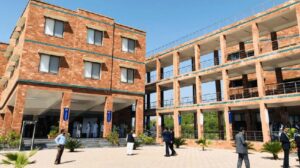
“Around the world when we discuss the status of higher education in different countries, there is unanimity of opinion that the developing country that has made the most rapid progress internationally in recent years is Pakistan. In no other country has the higher education sector seen such spectacular positive developments as that in Pakistan during the last six years. After the formation of the Higher Education Commission, a silent revolution occurred and probably the best digital library in the world was set up in Pakistan.”
The progress made in Pakistan during the short period between 2000 and 2008 rang alarm bells in India. On 23 July 2006, an article was published in the leading daily Indian newspaper Hindustan Times, entitled “Pak Threat to Indian Science.” A detailed presentation was made to the Indian Prime Minister, Mr. Manmohan Singh, about the rapid strides that Pakistan was making in the higher education sector after the establishment of the Higher Education Commission in October 2002 and my appointment as its first Chairman. The article began with the sentence “Pakistan may soon join China in giving India serious competition in science.”
India then decided to follow our footsteps and established the Higher Education Commission of India.
My contributions were internationally recognised and acknowledged. The Austrian Government conferred its high civil award Grosse Goldene Ehrenzeischen am Bande (2007) on the author for transforming the Higher Education sector in Pakistan. The TWAS (Academy of Sciences for the Developing World, Italy) Award for Institutional Development was conferred on the author in October 2009. Institutions were established in my honour in China and Malaysia. I was also conferred the highest national award of China personally by H.E. President Xi Jinping in January 2020, a truly humbling experience.
The nation owes its thanks to Prime Minister Imran Khan for fully supporting these efforts of the Knowledge Economy Task Force.
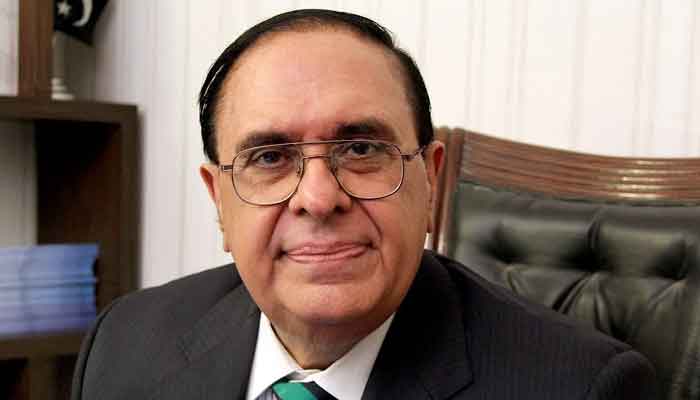
The writer is a Vice-chairman of the Prime Minister’s Task Force on Science & Technology.


